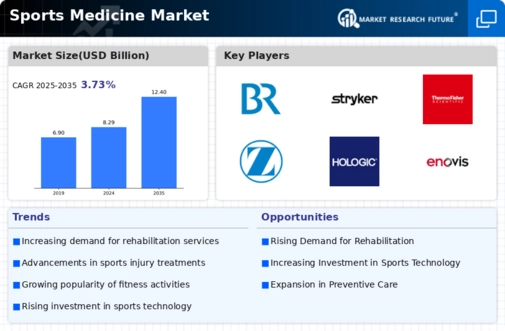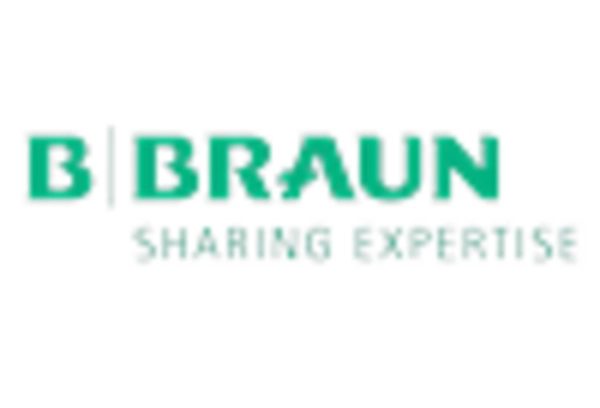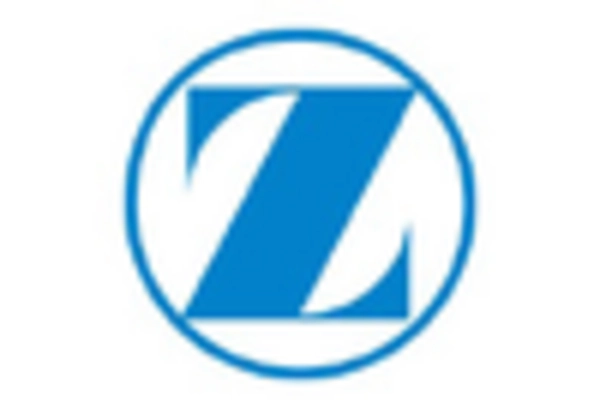Braces Supports
Therapeutic Devices
Surgery Equipment
Pain Management
Rehabilitation Equipment
Injury Prevention
Athletic Performance Enhancement
Rehabilitation
Pain Management
Health Monitoring
Hospitals
Sports Clinics
Home Healthcare
Fitness Centers
Rehabilitation Centers
Direct Sales
Online Sales
Retail Sales
Wholesale
Distributors
North America
Europe
South America
Asia Pacific
Middle East and Africa
North America Outlook (USD Billion, 2019-2035)
North America Sports Medicine Market by Products Type
Braces Supports
Therapeutic Devices
Surgery Equipment
Pain Management
Rehabilitation Equipment
North America Sports Medicine Market by Application Type
Injury Prevention
Athletic Performance Enhancement
Rehabilitation
Pain Management
Health Monitoring
North America Sports Medicine Market by End Use Type
Hospitals
Sports Clinics
Home Healthcare
Fitness Centers
Rehabilitation Centers
North America Sports Medicine Market by Distribution Channel Type
Direct Sales
Online Sales
Retail Sales
Wholesale
Distributors
North America Sports Medicine Market by Regional Type
US
Canada
US Outlook (USD Billion, 2019-2035)
US Sports Medicine Market by Products Type
Braces Supports
Therapeutic Devices
Surgery Equipment
Pain Management
Rehabilitation Equipment
US Sports Medicine Market by Application Type
Injury Prevention
Athletic Performance Enhancement
Rehabilitation
Pain Management
Health Monitoring
US Sports Medicine Market by End Use Type
Hospitals
Sports Clinics
Home Healthcare
Fitness Centers
Rehabilitation Centers
US Sports Medicine Market by Distribution Channel Type
Direct Sales
Online Sales
Retail Sales
Wholesale
Distributors
CANADA Outlook (USD Billion, 2019-2035)
CANADA Sports Medicine Market by Products Type
Braces Supports
Therapeutic Devices
Surgery Equipment
Pain Management
Rehabilitation Equipment
CANADA Sports Medicine Market by Application Type
Injury Prevention
Athletic Performance Enhancement
Rehabilitation
Pain Management
Health Monitoring
CANADA Sports Medicine Market by End Use Type
Hospitals
Sports Clinics
Home Healthcare
Fitness Centers
Rehabilitation Centers
CANADA Sports Medicine Market by Distribution Channel Type
Direct Sales
Online Sales
Retail Sales
Wholesale
Distributors
Europe Outlook (USD Billion, 2019-2035)
Europe Sports Medicine Market by Products Type
Braces Supports
Therapeutic Devices
Surgery Equipment
Pain Management
Rehabilitation Equipment
Europe Sports Medicine Market by Application Type
Injury Prevention
Athletic Performance Enhancement
Rehabilitation
Pain Management
Health Monitoring
Europe Sports Medicine Market by End Use Type
Hospitals
Sports Clinics
Home Healthcare
Fitness Centers
Rehabilitation Centers
Europe Sports Medicine Market by Distribution Channel Type
Direct Sales
Online Sales
Retail Sales
Wholesale
Distributors
Europe Sports Medicine Market by Regional Type
Germany
UK
France
Russia
Italy
Spain
Rest of Europe
GERMANY Outlook (USD Billion, 2019-2035)
GERMANY Sports Medicine Market by Products Type
Braces Supports
Therapeutic Devices
Surgery Equipment
Pain Management
Rehabilitation Equipment
GERMANY Sports Medicine Market by Application Type
Injury Prevention
Athletic Performance Enhancement
Rehabilitation
Pain Management
Health Monitoring
GERMANY Sports Medicine Market by End Use Type
Hospitals
Sports Clinics
Home Healthcare
Fitness Centers
Rehabilitation Centers
GERMANY Sports Medicine Market by Distribution Channel Type
Direct Sales
Online Sales
Retail Sales
Wholesale
Distributors
UK Outlook (USD Billion, 2019-2035)
UK Sports Medicine Market by Products Type
Braces Supports
Therapeutic Devices
Surgery Equipment
Pain Management
Rehabilitation Equipment
UK Sports Medicine Market by Application Type
Injury Prevention
Athletic Performance Enhancement
Rehabilitation
Pain Management
Health Monitoring
UK Sports Medicine Market by End Use Type
Hospitals
Sports Clinics
Home Healthcare
Fitness Centers
Rehabilitation Centers
UK Sports Medicine Market by Distribution Channel Type
Direct Sales
Online Sales
Retail Sales
Wholesale
Distributors
FRANCE Outlook (USD Billion, 2019-2035)
FRANCE Sports Medicine Market by Products Type
Braces Supports
Therapeutic Devices
Surgery Equipment
Pain Management
Rehabilitation Equipment
FRANCE Sports Medicine Market by Application Type
Injury Prevention
Athletic Performance Enhancement
Rehabilitation
Pain Management
Health Monitoring
FRANCE Sports Medicine Market by End Use Type
Hospitals
Sports Clinics
Home Healthcare
Fitness Centers
Rehabilitation Centers
FRANCE Sports Medicine Market by Distribution Channel Type
Direct Sales
Online Sales
Retail Sales
Wholesale
Distributors
RUSSIA Outlook (USD Billion, 2019-2035)
RUSSIA Sports Medicine Market by Products Type
Braces Supports
Therapeutic Devices
Surgery Equipment
Pain Management
Rehabilitation Equipment
RUSSIA Sports Medicine Market by Application Type
Injury Prevention
Athletic Performance Enhancement
Rehabilitation
Pain Management
Health Monitoring
RUSSIA Sports Medicine Market by End Use Type
Hospitals
Sports Clinics
Home Healthcare
Fitness Centers
Rehabilitation Centers
RUSSIA Sports Medicine Market by Distribution Channel Type
Direct Sales
Online Sales
Retail Sales
Wholesale
Distributors
ITALY Outlook (USD Billion, 2019-2035)
ITALY Sports Medicine Market by Products Type
Braces Supports
Therapeutic Devices
Surgery Equipment
Pain Management
Rehabilitation Equipment
ITALY Sports Medicine Market by Application Type
Injury Prevention
Athletic Performance Enhancement
Rehabilitation
Pain Management
Health Monitoring
ITALY Sports Medicine Market by End Use Type
Hospitals
Sports Clinics
Home Healthcare
Fitness Centers
Rehabilitation Centers
ITALY Sports Medicine Market by Distribution Channel Type
Direct Sales
Online Sales
Retail Sales
Wholesale
Distributors
SPAIN Outlook (USD Billion, 2019-2035)
SPAIN Sports Medicine Market by Products Type
Braces Supports
Therapeutic Devices
Surgery Equipment
Pain Management
Rehabilitation Equipment
SPAIN Sports Medicine Market by Application Type
Injury Prevention
Athletic Performance Enhancement
Rehabilitation
Pain Management
Health Monitoring
SPAIN Sports Medicine Market by End Use Type
Hospitals
Sports Clinics
Home Healthcare
Fitness Centers
Rehabilitation Centers
SPAIN Sports Medicine Market by Distribution Channel Type
Direct Sales
Online Sales
Retail Sales
Wholesale
Distributors
REST OF EUROPE Outlook (USD Billion, 2019-2035)
REST OF EUROPE Sports Medicine Market by Products Type
Braces Supports
Therapeutic Devices
Surgery Equipment
Pain Management
Rehabilitation Equipment
REST OF EUROPE Sports Medicine Market by Application Type
Injury Prevention
Athletic Performance Enhancement
Rehabilitation
Pain Management
Health Monitoring
REST OF EUROPE Sports Medicine Market by End Use Type
Hospitals
Sports Clinics
Home Healthcare
Fitness Centers
Rehabilitation Centers
REST OF EUROPE Sports Medicine Market by Distribution Channel Type
Direct Sales
Online Sales
Retail Sales
Wholesale
Distributors
APAC Outlook (USD Billion, 2019-2035)
APAC Sports Medicine Market by Products Type
Braces Supports
Therapeutic Devices
Surgery Equipment
Pain Management
Rehabilitation Equipment
APAC Sports Medicine Market by Application Type
Injury Prevention
Athletic Performance Enhancement
Rehabilitation
Pain Management
Health Monitoring
APAC Sports Medicine Market by End Use Type
Hospitals
Sports Clinics
Home Healthcare
Fitness Centers
Rehabilitation Centers
APAC Sports Medicine Market by Distribution Channel Type
Direct Sales
Online Sales
Retail Sales
Wholesale
Distributors
APAC Sports Medicine Market by Regional Type
China
India
Japan
South Korea
Malaysia
Thailand
Indonesia
Rest of APAC
CHINA Outlook (USD Billion, 2019-2035)
CHINA Sports Medicine Market by Products Type
Braces Supports
Therapeutic Devices
Surgery Equipment
Pain Management
Rehabilitation Equipment
CHINA Sports Medicine Market by Application Type
Injury Prevention
Athletic Performance Enhancement
Rehabilitation
Pain Management
Health Monitoring
CHINA Sports Medicine Market by End Use Type
Hospitals
Sports Clinics
Home Healthcare
Fitness Centers
Rehabilitation Centers
CHINA Sports Medicine Market by Distribution Channel Type
Direct Sales
Online Sales
Retail Sales
Wholesale
Distributors
INDIA Outlook (USD Billion, 2019-2035)
INDIA Sports Medicine Market by Products Type
Braces Supports
Therapeutic Devices
Surgery Equipment
Pain Management
Rehabilitation Equipment
INDIA Sports Medicine Market by Application Type
Injury Prevention
Athletic Performance Enhancement
Rehabilitation
Pain Management
Health Monitoring
INDIA Sports Medicine Market by End Use Type
Hospitals
Sports Clinics
Home Healthcare
Fitness Centers
Rehabilitation Centers
INDIA Sports Medicine Market by Distribution Channel Type
Direct Sales
Online Sales
Retail Sales
Wholesale
Distributors
JAPAN Outlook (USD Billion, 2019-2035)
JAPAN Sports Medicine Market by Products Type
Braces Supports
Therapeutic Devices
Surgery Equipment
Pain Management
Rehabilitation Equipment
JAPAN Sports Medicine Market by Application Type
Injury Prevention
Athletic Performance Enhancement
Rehabilitation
Pain Management
Health Monitoring
JAPAN Sports Medicine Market by End Use Type
Hospitals
Sports Clinics
Home Healthcare
Fitness Centers
Rehabilitation Centers
JAPAN Sports Medicine Market by Distribution Channel Type
Direct Sales
Online Sales
Retail Sales
Wholesale
Distributors
SOUTH KOREA Outlook (USD Billion, 2019-2035)
SOUTH KOREA Sports Medicine Market by Products Type
Braces Supports
Therapeutic Devices
Surgery Equipment
Pain Management
Rehabilitation Equipment
SOUTH KOREA Sports Medicine Market by Application Type
Injury Prevention
Athletic Performance Enhancement
Rehabilitation
Pain Management
Health Monitoring
SOUTH KOREA Sports Medicine Market by End Use Type
Hospitals
Sports Clinics
Home Healthcare
Fitness Centers
Rehabilitation Centers
SOUTH KOREA Sports Medicine Market by Distribution Channel Type
Direct Sales
Online Sales
Retail Sales
Wholesale
Distributors
MALAYSIA Outlook (USD Billion, 2019-2035)
MALAYSIA Sports Medicine Market by Products Type
Braces Supports
Therapeutic Devices
Surgery Equipment
Pain Management
Rehabilitation Equipment
MALAYSIA Sports Medicine Market by Application Type
Injury Prevention
Athletic Performance Enhancement
Rehabilitation
Pain Management
Health Monitoring
MALAYSIA Sports Medicine Market by End Use Type
Hospitals
Sports Clinics
Home Healthcare
Fitness Centers
Rehabilitation Centers
MALAYSIA Sports Medicine Market by Distribution Channel Type
Direct Sales
Online Sales
Retail Sales
Wholesale
Distributors
THAILAND Outlook (USD Billion, 2019-2035)
THAILAND Sports Medicine Market by Products Type
Braces Supports
Therapeutic Devices
Surgery Equipment
Pain Management
Rehabilitation Equipment
THAILAND Sports Medicine Market by Application Type
Injury Prevention
Athletic Performance Enhancement
Rehabilitation
Pain Management
Health Monitoring
THAILAND Sports Medicine Market by End Use Type
Hospitals
Sports Clinics
Home Healthcare
Fitness Centers
Rehabilitation Centers
THAILAND Sports Medicine Market by Distribution Channel Type
Direct Sales
Online Sales
Retail Sales
Wholesale
Distributors
INDONESIA Outlook (USD Billion, 2019-2035)
INDONESIA Sports Medicine Market by Products Type
Braces Supports
Therapeutic Devices
Surgery Equipment
Pain Management
Rehabilitation Equipment
INDONESIA Sports Medicine Market by Application Type
Injury Prevention
Athletic Performance Enhancement
Rehabilitation
Pain Management
Health Monitoring
INDONESIA Sports Medicine Market by End Use Type
Hospitals
Sports Clinics
Home Healthcare
Fitness Centers
Rehabilitation Centers
INDONESIA Sports Medicine Market by Distribution Channel Type
Direct Sales
Online Sales
Retail Sales
Wholesale
Distributors
REST OF APAC Outlook (USD Billion, 2019-2035)
REST OF APAC Sports Medicine Market by Products Type
Braces Supports
Therapeutic Devices
Surgery Equipment
Pain Management
Rehabilitation Equipment
REST OF APAC Sports Medicine Market by Application Type
Injury Prevention
Athletic Performance Enhancement
Rehabilitation
Pain Management
Health Monitoring
REST OF APAC Sports Medicine Market by End Use Type
Hospitals
Sports Clinics
Home Healthcare
Fitness Centers
Rehabilitation Centers
REST OF APAC Sports Medicine Market by Distribution Channel Type
Direct Sales
Online Sales
Retail Sales
Wholesale
Distributors
South America Outlook (USD Billion, 2019-2035)
South America Sports Medicine Market by Products Type
Braces Supports
Therapeutic Devices
Surgery Equipment
Pain Management
Rehabilitation Equipment
South America Sports Medicine Market by Application Type
Injury Prevention
Athletic Performance Enhancement
Rehabilitation
Pain Management
Health Monitoring
South America Sports Medicine Market by End Use Type
Hospitals
Sports Clinics
Home Healthcare
Fitness Centers
Rehabilitation Centers
South America Sports Medicine Market by Distribution Channel Type
Direct Sales
Online Sales
Retail Sales
Wholesale
Distributors
South America Sports Medicine Market by Regional Type
Brazil
Mexico
Argentina
Rest of South America
BRAZIL Outlook (USD Billion, 2019-2035)
BRAZIL Sports Medicine Market by Products Type
Braces Supports
Therapeutic Devices
Surgery Equipment
Pain Management
Rehabilitation Equipment
BRAZIL Sports Medicine Market by Application Type
Injury Prevention
Athletic Performance Enhancement
Rehabilitation
Pain Management
Health Monitoring
BRAZIL Sports Medicine Market by End Use Type
Hospitals
Sports Clinics
Home Healthcare
Fitness Centers
Rehabilitation Centers
BRAZIL Sports Medicine Market by Distribution Channel Type
Direct Sales
Online Sales
Retail Sales
Wholesale
Distributors
MEXICO Outlook (USD Billion, 2019-2035)
MEXICO Sports Medicine Market by Products Type
Braces Supports
Therapeutic Devices
Surgery Equipment
Pain Management
Rehabilitation Equipment
MEXICO Sports Medicine Market by Application Type
Injury Prevention
Athletic Performance Enhancement
Rehabilitation
Pain Management
Health Monitoring
MEXICO Sports Medicine Market by End Use Type
Hospitals
Sports Clinics
Home Healthcare
Fitness Centers
Rehabilitation Centers
MEXICO Sports Medicine Market by Distribution Channel Type
Direct Sales
Online Sales
Retail Sales
Wholesale
Distributors
ARGENTINA Outlook (USD Billion, 2019-2035)
ARGENTINA Sports Medicine Market by Products Type
Braces Supports
Therapeutic Devices
Surgery Equipment
Pain Management
Rehabilitation Equipment
ARGENTINA Sports Medicine Market by Application Type
Injury Prevention
Athletic Performance Enhancement
Rehabilitation
Pain Management
Health Monitoring
ARGENTINA Sports Medicine Market by End Use Type
Hospitals
Sports Clinics
Home Healthcare
Fitness Centers
Rehabilitation Centers
ARGENTINA Sports Medicine Market by Distribution Channel Type
Direct Sales
Online Sales
Retail Sales
Wholesale
Distributors
REST OF SOUTH AMERICA Outlook (USD Billion, 2019-2035)
REST OF SOUTH AMERICA Sports Medicine Market by Products Type
Braces Supports
Therapeutic Devices
Surgery Equipment
Pain Management
Rehabilitation Equipment
REST OF SOUTH AMERICA Sports Medicine Market by Application Type
Injury Prevention
Athletic Performance Enhancement
Rehabilitation
Pain Management
Health Monitoring
REST OF SOUTH AMERICA Sports Medicine Market by End Use Type
Hospitals
Sports Clinics
Home Healthcare
Fitness Centers
Rehabilitation Centers
REST OF SOUTH AMERICA Sports Medicine Market by Distribution Channel Type
Direct Sales
Online Sales
Retail Sales
Wholesale
Distributors
MEA Outlook (USD Billion, 2019-2035)
MEA Sports Medicine Market by Products Type
Braces Supports
Therapeutic Devices
Surgery Equipment
Pain Management
Rehabilitation Equipment
MEA Sports Medicine Market by Application Type
Injury Prevention
Athletic Performance Enhancement
Rehabilitation
Pain Management
Health Monitoring
MEA Sports Medicine Market by End Use Type
Hospitals
Sports Clinics
Home Healthcare
Fitness Centers
Rehabilitation Centers
MEA Sports Medicine Market by Distribution Channel Type
Direct Sales
Online Sales
Retail Sales
Wholesale
Distributors
MEA Sports Medicine Market by Regional Type
GCC Countries
South Africa
Rest of MEA
GCC COUNTRIES Outlook (USD Billion, 2019-2035)
GCC COUNTRIES Sports Medicine Market by Products Type
Braces Supports
Therapeutic Devices
Surgery Equipment
Pain Management
Rehabilitation Equipment
GCC COUNTRIES Sports Medicine Market by Application Type
Injury Prevention
Athletic Performance Enhancement
Rehabilitation
Pain Management
Health Monitoring
GCC COUNTRIES Sports Medicine Market by End Use Type
Hospitals
Sports Clinics
Home Healthcare
Fitness Centers
Rehabilitation Centers
GCC COUNTRIES Sports Medicine Market by Distribution Channel Type
Direct Sales
Online Sales
Retail Sales
Wholesale
Distributors
SOUTH AFRICA Outlook (USD Billion, 2019-2035)
SOUTH AFRICA Sports Medicine Market by Products Type
Braces Supports
Therapeutic Devices
Surgery Equipment
Pain Management
Rehabilitation Equipment
SOUTH AFRICA Sports Medicine Market by Application Type
Injury Prevention
Athletic Performance Enhancement
Rehabilitation
Pain Management
Health Monitoring
SOUTH AFRICA Sports Medicine Market by End Use Type
Hospitals
Sports Clinics
Home Healthcare
Fitness Centers
Rehabilitation Centers
SOUTH AFRICA Sports Medicine Market by Distribution Channel Type
Direct Sales
Online Sales
Retail Sales
Wholesale
Distributors
REST OF MEA Outlook (USD Billion, 2019-2035)
REST OF MEA Sports Medicine Market by Products Type
Braces Supports
Therapeutic Devices
Surgery Equipment
Pain Management
Rehabilitation Equipment
REST OF MEA Sports Medicine Market by Application Type
Injury Prevention
Athletic Performance Enhancement
Rehabilitation
Pain Management
Health Monitoring
REST OF MEA Sports Medicine Market by End Use Type
Hospitals
Sports Clinics
Home Healthcare
Fitness Centers
Rehabilitation Centers
REST OF MEA Sports Medicine Market by Distribution Channel Type
Direct Sales
Online Sales
Retail Sales
Wholesale
Distributors









Leave a Comment